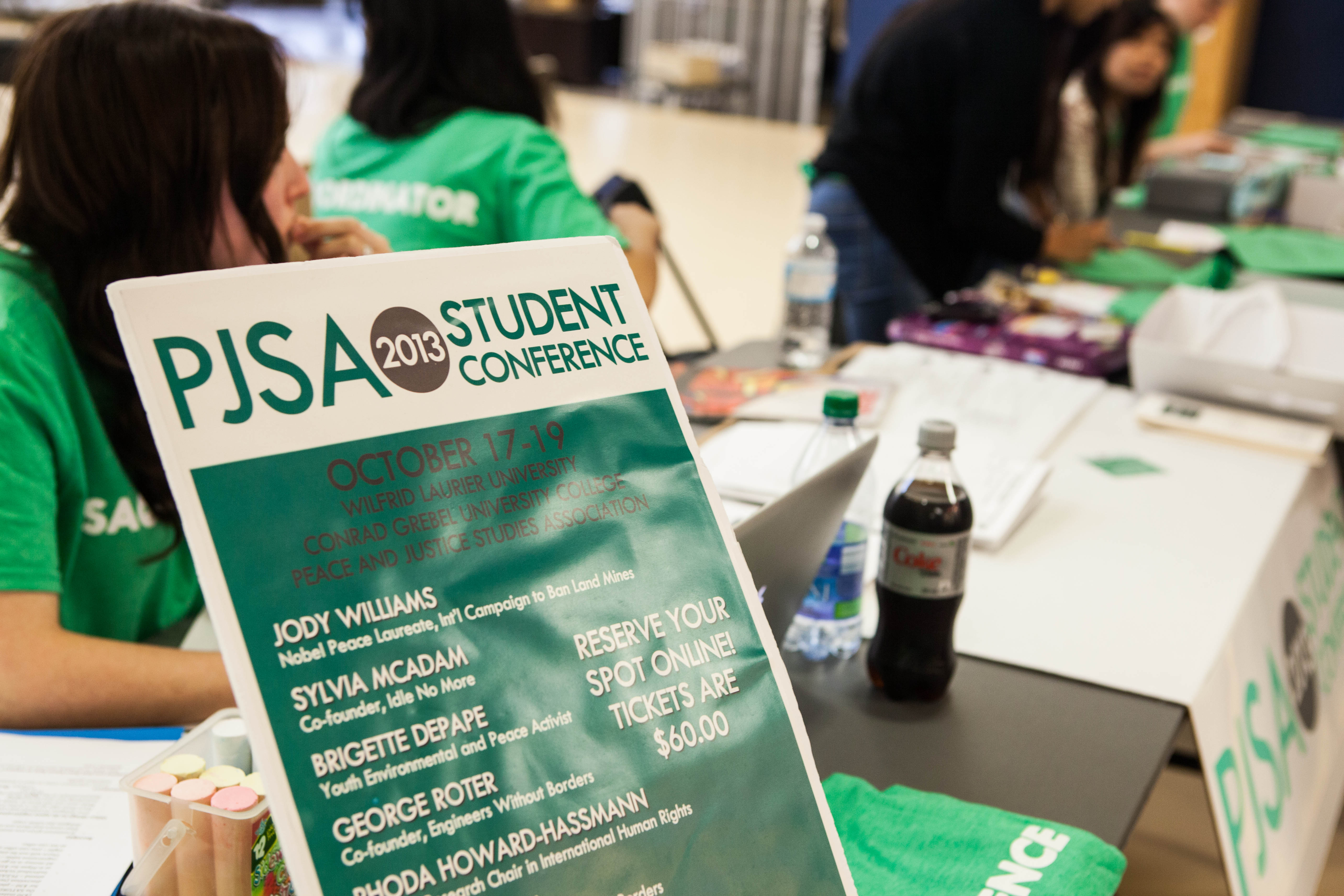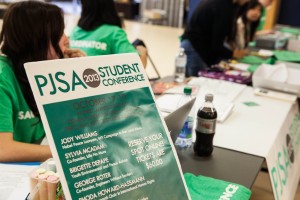A middle ground for social change


Academics and activists found common ground last week at Wilfrid Laurier University, where nearly 500 people gathered for the 2013 Peace and Justice Studies Association (PJSA) conference.
“The plenaries were really well attended for an academic conference. They were well-attended, well-received. The speakers, every one of them, just really delivered well,” said conference organizer and WLU global studies professor Edmund Pries.
Pries said that the conference, which had been in the works for about two years, was a smooth success.
“I just really felt that the local organizers were able to pull together all of the pieces in a very innovative and productive way,” commented Rick McCutcheon, PJSA co-chair. “Overall, I just think that this was one of the best conferences the organization has pulled off.”
This year’s theme was “peace studies between tradition and innovation.”
“The key is that in peace and justice studies, we need to be very thoroughly grounded and rooted in tradition. It’s what gives us stability. It keeps us from going off on tangents that maybe aren’t as productive,” McCutcheon explained. “At the same time, as we see the world moving forward in a whole range of areas, it’s clear that we’re going to have to start thinking outside of the box.”
A student conference, coordinated by fifth-year global studies student Jorden Johnstone, ran alongside the main conference from Thursday to Saturday.
“I think especially with any event on campus, it’s hard to get students out. There’s kind of a sense of, I don’t want to say apathy, but especially with midterm season, right after Thanksgiving, numbers weren’t exactly as expected,” she said. “But I think that also allowed for more individual experience, where students could get to know each other a bit more.”
Johnstone said that about 130 people signed up to participate, but not all of them attended.
For Laura Viselli, the conference was “the highlight of my university career.”
Viselli, a fourth-year global studies student, said seeing former South Sudanese child soldier and musician Emmanuel Jal was the highlight, as the conflict in that area was one of her main motivators for selecting her program.
“It’s like everything came full circle. I literally got to touch the reason I’m in global studies, so it was amazing,” she said.
Participants saw a number of presentations, including addresses from Sylvia McAdam, James Orbinski, Jody Williams and others. Many of the speakers were able to focus on contemporary social justice issues and causes, giving participants a framework to consider the status of social justice in Canada today.
“Some people argue that we are apathetic. I don’t. I think that we’re engaged in different ways,” said McCutcheon.
While activism may not be visible in the traditional sense, he believes people are still very connected to social issues, but through new mediums like social media.
“I do think that our government is suppressing some of that coming out in a more public way and I think that one of things a lot of social activists are working on is finding new ways to circumvent, get around the Harper government’s efforts to sort of put a lid on dissent,” he continued.
For Pries, creating social change isn’t just about scholarly work or activism – it has to be a combination of both.
“PJSA is unique among academic societies in the sense that it is not only academics. It’s academics, activists, practitioners,” he said. “It is unique that way and it creates a certain richness.”
-Lindsay Purchase
———-
Slyvia McAdam
Sylvia McAdam remembers working in the sugar beet fields in Alberta when she was five years old.
Her parents weren’t farmers — being forced by the government to work the fields in the summer months was just part of her experience growing up as an indigenous person in Canada. They called them the “grab-a-hoe Indians.”
McAdam, co-founder of the national Indigenous rights movement Idle No More, presented her experiences, the history of Indigenous resistance in Canada and where the movement is today in her presentation last Friday, which took place at the Maureen Forrester Recital Hall.
“Idle No More didn’t begin yesterday or last year or the year before; there’s a history of resistance that has been silenced, there has been a measure of erasure of that resistance,” she said, drawing on examples such as the Burnt Church dispute and the Oka crisis.
Central to Idle No More and McAdam’s involvement is the destruction of Canada’s natural resources through processes like logging and mineral extraction.
“It’s astounding how much devastation there is out in the land,” she said, using the tar sands as an example.
“The Canadian state acts like it owns the resources. When you look at the poverty of Indigenous people, when you dispossess a nation of people, you create a dependency. And that dependency has created our poverty.”
Before speaking, McAdam was honoured with performances from the Aboriginal Student Centre hand drumming group. Volunteers also did a smudging of the auditorium.
McAdam asserted that the populations represented by the movement don’t need help; what they’re looking for is support.
“Don’t join Idle No More because you think you feel a sense of guilt … because you won’t last very long. Do it for the love of our children, do it for the love of our lands, do it for the love of our water, because that will sustain you much longer than hate or guilt,” she said.
McAdam emphasized the importance of anti-racist, anti-oppressive and anti-colonial education as critical pieces of moving toward peace, when asked how the movement can be supported.
“This veil of innocence that Canada portrays to the world, and this veil of innocence is we have democracy, we have equality, we’re multicultural, there’s freedom here. And what Idle No More is doing is challenging that,” she explained. “We’re poking at that veil of innocence and saying, ‘what about the residential schools? What about the Indian Act?’”
-Lindsay Purchase
James Orbinski:
For Dr. James Orbinski, all we need to do is to listen, to speak, to think and to act.
These four ordinary concepts were the main themes of Orbinski’s plenary session at the Peace and Justice Studies Association annual conference on Friday. Orbinski, who is known for his humanitarian work during the Rwanda Genocide in 1994, discussed “Equity in Global Health” to a crowd of students and academics at Wilfrid Laurier University.
After heading the Medecins Sans Frontires (MSF) from 1999-2001, as well becoming the chair in Global Health Governance and the director of the Africa Initiative at the Centre for International Governance Innovation (CIGI), Orbinski has now focused his work on the impact of climate change on global health.
“We are at a moment — I believe, and many people believe this — in our human history and human story, where we must face squarely the unavoidable complexity, interdependence and fragility of our human condition,” Orbinski explained, noting many of the situations that currently occur around the world in terms of climate change and global health.
“We are literally altering the very nature of nature,” he explicitly stated in his talk.
With warmer temperatures and altering conditions, which could result in droughts or flooding, many developing countries face challenges with food production and their economy.
Orbinski is clearly no stranger to humanitarian issues. In addition to his work in Rwanda, Orbinski has been a huge advocate for cheaper medication and treatment for HIV and AIDS, as well as many neglected diseases not widely known in the Western world. And he knows it isn’t an easy process when finding a solution.
“This is always an imperfect process, it never leads to certainty, it never leads to certain outcomes,” he explained. “It does not, however, mean that we don’t engage the world.”
Instead of focusing on what tradition and innovation should look like in the future of humanitarianism, Orbinski explained to the audience that any change — no matter how big or how small — begins with speaking.
“Not just simply through dialogue, but I used a very careful word, but through dialogic,” he continued.
Once dialogue happens, solutions can be discussed and thought about. And then, as Orbinksi stated with his own work, those solutions can be acted on.
“In the process of being in relationship to each other, of speaking, of seeing face-to-face … we create our political architecture,” he said.
-Justin Smirlies

